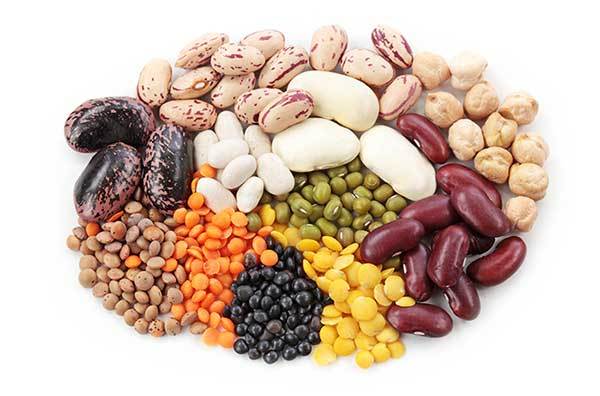Can Dogs Eat Beans?
The short answer to this question is that yes, dogs can actually eat beans. But going into details of dogs and beans, you will realize that not all beans is good for your canine friends.
So, the questions we should rather be dealing with is whether the beans is raw or cooked, whether it is canned or not and if cooked, the right cooking methods should also be thoroughly adhered to.
As you probably already know, our canine friends consume various foods that are consumed by their human owners. But, is it safe for dogs to eat beans?
In a bid to uncover the benefits or potential harm that beans could pose to your dog, it is imperative that we first understand the nutritional elements of beans.
Table of Contents
How Nutritious Are Beans?
First and foremost, beans are a rich source of protein, which means they are not only healthy but also nutritious. To humans, beans pack lots of nutritional benefits, some of which are discussed below.
1. Lower in Calorie
As we have already mentioned, beans are a healthier alternative to those looking for a highly-nutritious protein diet. They are rich in amino acids which form the building blocks of all protein foods.
Compared to other forms of protein such as animal proteins and dairy products, beans pack fewer calories, which makes them a great option for vegans.
2. Contain Antioxidants
Beans are also rich in antioxidants, a notable mention being polyphenols. This group of antioxidants are known for their ability to fight free radicals, thereby keeping you safe from a wide range of conditions such as cancer and premature aging.
In regards to fighting the growth of cancerous cells, black beans have especially been encouraged due to their immense anti-inflammatory and antioxidant properties.
3. Improving Gut Health
According to research, there is a wide variety of beans that have been recommended for the enhancement of gut health.
Again, black beans gets a mention here. It has especially been cited for its ability to raise the number of the healthy gut bacteria, thereby keeping gut-related diseases at bay.
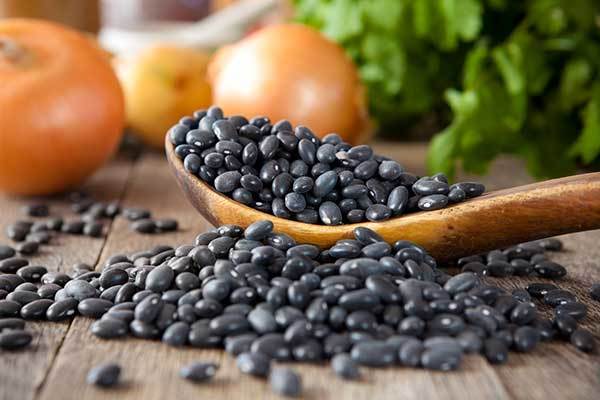
4. Prevention of Fatty Liver
As the name suggests, this is a condition that comes about as a result of the accumulation of excess fat on the liver. Thankfully, it is a condition that can be permanently reversed by taking beans.
Adzuki beans have been most successful in regards to fatty liver. As a result, you will have a healthier liver and a generally more improved immunity.
5. Improving the Cardiovascular Health
According to research, people who consume a diet of beans have demonstrated better ability to fight off cardiovascular diseases such as stroke, heart disease, heart attack and blood pressure.
In addition, beans significantly lowers your blood sugar level, thereby leading to an overall healthier heart.
ALSO READ: Can Dogs Eat Sunflower Seeds? Or What About Peanut Butter?
6. Appetite Suppressant
Beans, like most plant-based proteins, are known for their appetite suppressing benefits.
Due to its high fiber content, beans create the effect of fullness after taking just a few spoons, as opposed to animal-based sources of protein such as red meat. This is ideal for people dealing with weight issues.
The high fiber content is also key in the prevention of yet another debilitating lifestyle condition – diabetes.
Fiber helps regulate the level of glucose in the body, keeping it within manageable levels. There have been inspiring reports from research studies pointing out to the high potent of soybeans to regulate glucose by improving the functions of the pancreatic cells.
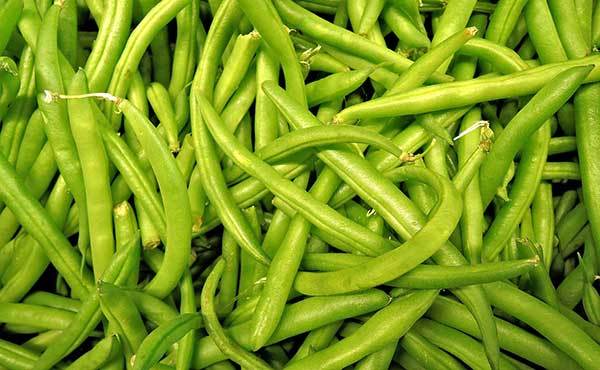
In addition to the above, beans contain many other vital nutritional elements that play various roles within the human body. Some of these include iron, folate, magnesium and iron.
But even after having investigated the possible benefits of beans to humans, you could still be wondering to yourself, are beans good for dogs?
Yes, much of the benefits humans derive from beans can also be tied back to dogs. That is for the simple reason that our metabolism and immune systems function in nearly the same way as those of our canine friends.
However, the following sections will help expound further on that.
Which Beans Variety Is Best For Dogs?
There are over 40,000 various types of beans. Some of them include the following;
1. Lima beans/butter beans,
2. Navy beans,
3. Pinto beans,
4. Black beans,
5. Black-eyed beans,
6. Soybeans,
7. Garbanzo beans,
8. Red beans,
9. Kidney beans,
10. Green beans/Green beans and
11. White beans.
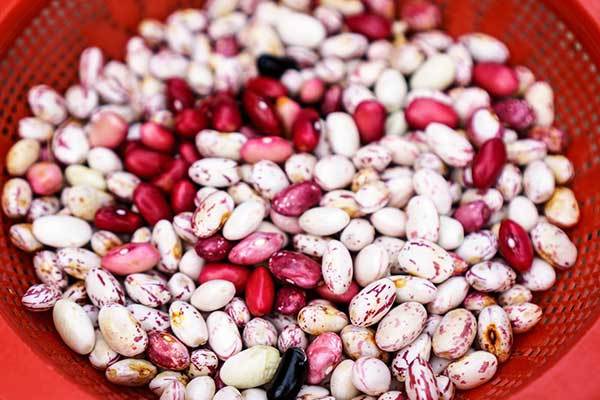
As you probably already guessed, not all the 40,000 + bean varieties are safe for dogs. And even those that are safe for consumption are not necessarily nutritious.
? The truth of the matter is that your dog depends so much on a protein diet. But being primarily carnivorous, dogs are more built for animal-based as opposed to plant-based proteins.
However, there are still lots of bean varieties you can comfortably add to your canine’s diet.
Kidney beans:
Can dogs have kidney beans? When discussing beans packed with the most nutritional elements, kidney beans will always get a mention.
But, can dogs eat kidney beans? These beans contain an abundance of antioxidants. Just remember that kidney beans also pack with a notorious toxin known as Phytohaemagglutinin.
However, soaking the beans before preparing it for your furry friend could help lower the effects of this toxic substance.
Black beans:
These beans are known for their antioxidant properties, as well as high content of vitamins A and K.
So, can I give my dog black beans? A diet of black beans will help improve your dog’s cardiovascular system, enhance his vision, among other immunity-boosting benefits.
Pinto Beans:
These are a type of kidney beans that contains lots of vitamins and mineral salts. Being rich in fiber, pinto beans are renowned for their ability to lower cholesterol in dogs.
These dried beans are also known for creating the effects of fullness, making them ideal for regulating your dog’s weight. Plus, they greatly aid in digestion and other gut-related conditions.
Garbanzo Beans:
Also known as chickpeas, garbanzo beans also pack lots of nutritional elements for dogs.
However, they have also been cited as containing potentially-harmful toxins. When preparing garbanzo beans, ensure you properly soak them in water and prepare them without any spicy or seasoning additives.
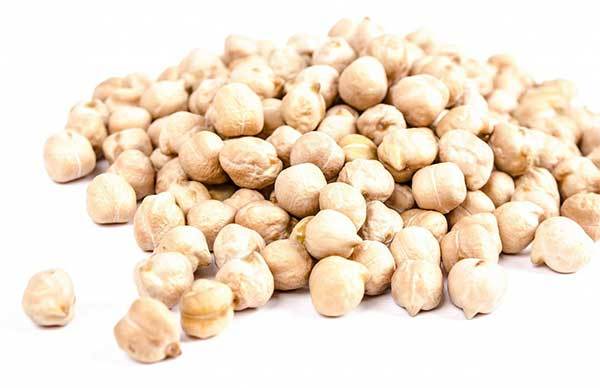
Soybeans:
Again, this is a kind of beans that though may be great for your dogs, should be given in small, measured amounts.
It is always wiser to insist in organically-grown soybeans and shun soybeans that are grown under intense pest treatments through pesticides and aerosols.
Lentils:
If you are wondering which variety of beans to add to your dog’s diet without risking flatulence, then lentils is the beans to go for.
Being alkaline, your dog can take as much of lentils as required without suffering any bloating problems. However, lentils have been linked to the likelihood of developing heart disease.
String Beans:
String beans are also known as green beans. These beans are rich in fiber, manganese and vitamins C and K. They not only boost your canine’s immune system but also help with fast healing of wounds.
One advantage of string beans is that they have been shared with dogs for such a long time that most canines have actually already developed a natural taste for these beans.
Lima Beans/Butter Beans:
Lima beans contain fiber that makes them ideal for preventing a surge in blood sugar level. Vets and nutritionists recommend lima beans for dogs battling with weight-related issues like diabetes.
So, if you have ever wondered to yourself, can diabetic dogs eat beans?
Well, you’ve got your answer right there. Being also rich in iron, lima beans help prevent muscle wastage and bone degeneration among dogs. Like garbanzo beans, they should also be prepared without any seasoning. When ready, you can serve them with rice or meat.
Which Bean Varieties Are Not Good For Dogs?
In as much as there are plenty of bean varieties to feed your dog, there are also other kinds of beans your dog should avoid like the plague. The following is a list of these beans.
1. Chili Beans:
Can dogs eat chili beans? Well, you probably already know that dogs do not generally agree with chili foods like onions and garlic. So, that means chili beans are not good for dogs.
Apart from gastric upset and flatulence, chili beans could also cause diarrhea and constipation.
2. Coffee Beans:
Caffeine found in coffee beans is among some of the worst stimulants you can expose your dog to.
? Though caffeine could cause no more than stimulating effects to humans, the substance could bring about severe damage to your dog’s neurological system and if not withdrawn, could eventually result in death.
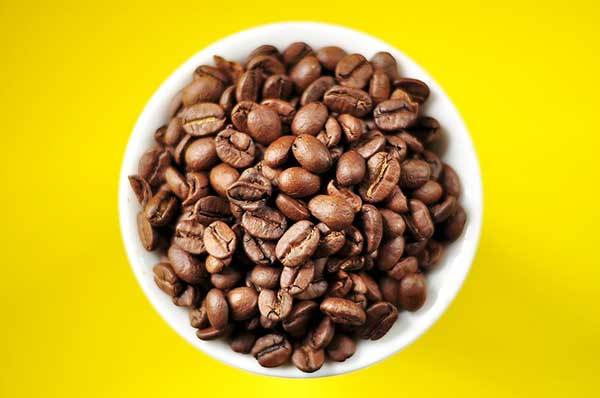
3. Adzuki Beans:
Humans have always been encouraged to consume adzuki beans for their ability to promote a healthy heart and aid in weight loss. However, these beans have been cited as causing toxicity when consumed with dogs.
4. Refried Beans:
Refried beans contain high amounts of seasonings like salt, garlic, chili powder and cumin. Based on that alone, these beans are not great for dogs.
5. Canned Beans:
Can dogs eat canned beans? All over the world, there is a gradual shift from canned to fresh foods, not only among the human population but also in the doggy world.
The canning itself is not necessarily dangerous, but the preservatives and additives used could be potentially harmful. Therefore, always read the label to take note the additives and other chemicals used.
For instance, sugars and other sweeteners should be avoided, as should sodium and spices. That is why experts recommend rinsing of any canned beans before serving it to your dog.
ALSO READ: Can Dogs Eat Whipped Cream? Or What About Ketchup?
6. Baked Beans:
Can dogs eat baked beans? Even before answering that question, we should first ask, what makes baked beans remarkably tasty?
It is the addition of sugar as a sweetener. And as we already mentioned, sugar is generally discouraged. Baked beans also contain onions, tomatoes, garlic and other seasonings, all the more the reason you should not serve it to your dog.
7. Fava Beans:
These are the kinds of beans that work wonders for humans but do the opposite for dogs. Packed with fewer calories and rich in fiber, fava beans could help you lose weight.
However, in dogs, fava beans cause a wide spectrum of side effects such as nausea and vomiting, diarrhea and constipation, abdominal pains, to mention but a few.
8. Raw Red Beans:
Red beans are perfectly fine when cooked.
However, raw red beans contains the toxic substance phytohaemagglutinin. This substance is associated with lots of gastrointestinal issues; from nausea and vomiting to diarrhea.
Are There Precautions To Take?
After going through some of the potential harmful effects of certain varieties of beans, you could be wondering to yourself, are beans bad for dogs?
Well, the general consensus is to insist on the recommended varieties and shun those deemed toxic. Even better, there are various measures you can adopt to reduce the toxicity of beans in general.
First and foremost, ensure that all beans for dogs is sourced from credible suppliers. You are safer with beans that are grown organically in your backyard.
But if you opt for canned and frozen beans as opposed to fresh beans, carefully check on the ingredients used. Especially look out for the content of sodium, sugars, spices, seasonings and other sweetening substances that are discouraged.
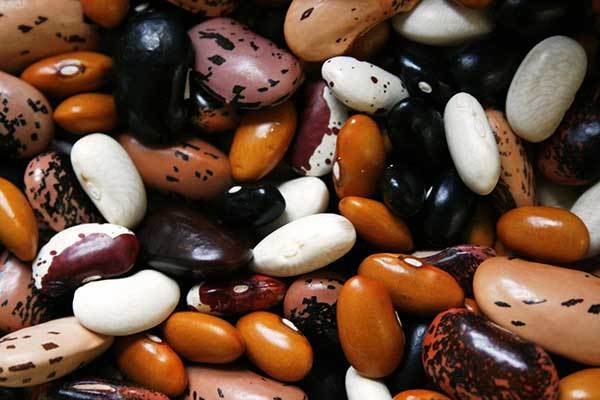
Next, ensure that all beans is washed before preparing them. This is done to remove chemicals in pesticides and other aerosols that may have been used when cultivating the plant. It is also meant to eliminate certain bacteria.
Of course, there is an exception to green beans that you can serve raw.
When cooking beans for your dogs, do not add any seasonings or fats. The cooking should be done in minimal to no fat, and served with rice or meat.
Lastly, and most importantly, ensure you only add beans to your dog’s diet in small portions. This should be an occasional treat when you wish to achieve certain nutritional goals. Beans should not form your dog’s staple diet.
? Remember that when all is said and done, beans should still contain lectins, which is a type of protein associated with nausea, diarrhea and abdominal pains. However, the protein is normally destroyed after cooking.
LEARN ABOUT IT: The Best Organic Dog Treats For Your Furry Friend
Conclusion
So, can dogs have beans?
Dogs can definitely eat beans. The secret lies in knowing which beans are more nutritious and which varieties are potentially toxic. However, how you handle the beans during the preparation method is also key.
Basically, ensure you thoroughly wash and rinse the beans to remove any preservatives and other chemical additives. Then, soak it overnight to further weaken the toxins present in the beans.
You can now cook your beans plain without any spices or seasoning before serving it to your dog. When serving, always mash the beans as then, it is easier to digest and absorb into the dog’s system.

